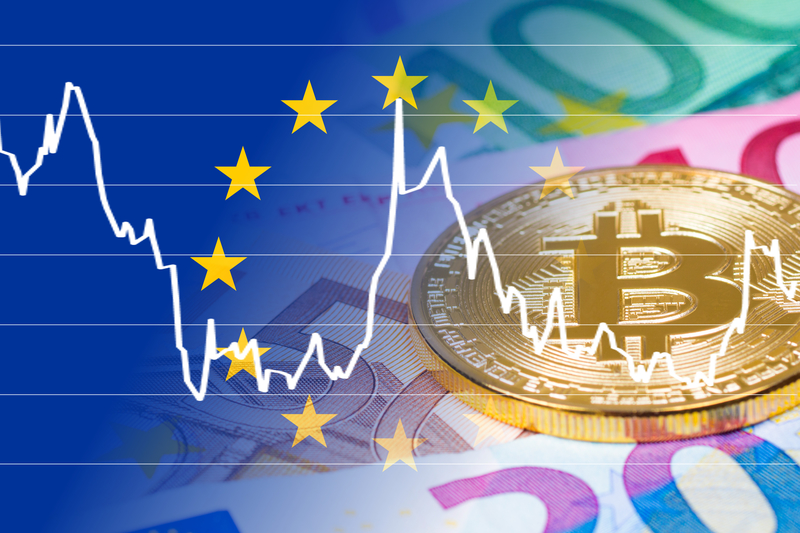Will the next bitcoin rally happen before the year is up or will the dips continue? It is hard to say for sure, but reviewing the bitcoin trends in Europe can help clarify some of the uncertainty
The status of bitcoin has been unclear in recent months as the value of bitcoin has struggled to stay above €3,000. While some speculate that a major surge is coming, every time the price goes up, it seems to dip back down a couple days later.
The growing awareness
Bitcoin experienced significant publicity last year as the price of the token skyrocketed. When the BTC price reached new highs in December 2017, most saw the future of bitcoin as promising and started pumping their money into it. But then some of the hype subsided and the prospect of a bubble emerged. This is when the situation changed. People sold their bitcoin or found new coins to invest in. The price ended up dropping substantially. The word of mouth and low awareness of risks had a lot to do with bitcoin’s erratic movements then.
Now, people are more wary about bitcoin than they were a year ago due to the growing public awareness. In fact, the recent ING study has revealed that 66% of European citizens are familiar with the bitcoin concept, 9% of the respondents own cryptocurrency, and around 25% are planning to invest in cryptocurrency in the future. Most Europeans do understand that bitcoin is a risky investment, with some mentioning shares as a safer bet. Still, 29% of respondents remain reluctant to embrace technology and ever invest in bitcoin.
These stats show that the general sentiment of European citizens isn’t driven by hype or FOMO. Their pro-Bitcoin (or conversely) attitude is largely based on high awareness of the market risks. If the trend persists, bitcoin will unlikely be seen as a get-rich-quick tool any more. Instead, it will attract sound investment and show greater stability.
The enhanced infrastructure
If anything is going to cause the BTC/EUR price to surge, it will be the arrival of institutional investors and the increasing number of outlets that accept bitcoin as a payment method.
Institutional investors
Typically, an individual investor only allocates a small percentage to any asset and has little to no chance of affecting the market. However, institutional investors have trillions in funds and can contribute to Bitcoin’s growth significantly. Right now, there are several things keeping these investors away.
Many of the large investment firms haven’t jumped aboard the bitcoin train because they consider it too high of a risk. The priority of these firms is to keep their clients safe, so they are going to avoid big risks unless essential infrastructure improvements are made. The likes of Fidelity Investments and Bakkt have already started working on the solutions that might help institutional investors trade digital currency safely.
Another issue is that all attempts to establish the regulated bitcoin exchange-traded fund have been unsuccessful so far. Such a vehicle would almost immediately draw large investment firms to the scene. But unfortunately, we are still waiting until the SEC gives the nod to ETFs. The main issue is that there are simply not enough precautions in place to protect Bitcoin investors.
Merchant acceptance
Cryptocurrency, and mainly bitcoin, has entered the financial arena with a clear goal of becoming the universal payment method, which is fast and secure. So far, bitcoin has been failing to prove itself as the future of online payments due to the lack of essential infrastructure. Luckily, the initial steps have already been taken that might facilitate Bitcoin acceptance across Europe.
FinTech startup Eligma is planning to launch an ambitious project and create the first-ever outlet centre powered by bitcoin. The idea behind this initiative is to open around 500 stores that will accept payments solely in cryptocurrency. The Bitcoin City aims to redefine the traditional concept of commerce and lay the foundation for a new shopping experience. This retail centre will be located in Slovenia.
Another piece of good news comes from Spain. Cyclebit, an innovative tech startup, has announced a partnership with the network of coffee shops. The Nostrum stores will be able to accept cryptocurrency using the Cyclebit payment solution based on ibox technology. Hopefully, the long-awaited dream of buying a cup of coffee with bitcoin will soon come true.
In addition to coffee shops, European customers can now spend their bitcoins in hundreds of restaurants and stores that support Wirex crypto debit cards, and in merchant outlets that use the CoinGate payment system. If this is not a step toward wider bitcoin adoption, then what is?
The forthcoming regulations
Most governments have started to accept that bitcoin is here to stay and that they need to establish a clear regulatory framework. More regulation is often considered a bad thing as investors think it means more restrictions. However, this is not always the case. If regulations can offer investors more security, they could be more willing to take a leap.
Bitcoin has also suffered from bad publicity related to scams and market manipulation, so the recognition by governments could improve faith in Bitcoin. What is needed is a good balance. Too much regulation will turn investors off, but less fraudulent activity is crucial.
So, what’s the EU stance on bitcoin and cryptocurrencies? Generally, the European Union has had a positive attitude toward the innovative form of money. The policymakers see bitcoin as a global phenomenon that should be taken advantage of but needs a closer regulation to remain safe and transparent. The EU pays extra attention to AML/KYC procedures that might help prevent criminal activities like money laundering, tax evasion, or terrorism financing. Thus, all cryptocurrency exchanges operating within the EU borders are forced to comply with the due diligence policy.
Conclusion
There are many obstacles right now standing in the way of bitcoin’s continued success. But things are already starting to change for the better. The regulatory framework is getting more defined, mass adoption is starting to become a reality, and faith in bitcoin as an asset is slowly growing. If all of this comes together at the right time and in the right way, a new influx from institutional investors will turn the bitcoin market on its head.
Yet, ultimately, the value of bitcoin is hard to predict. The price could soar way up and then immediately drop back down. Anything is possible. Investing in bitcoin offers many possibilities, but it also comes with risks that are hard to see coming.











